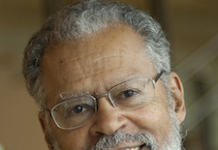 In the past two presidential elections, Black voters turned out in large numbers to support the candidacy of Barack Obama. Previously, Black voter participation rates traditionally lagged those of Whites. Many political observers wonder if Black voter participation rates will decline when Obama’s presidency is over.
In the past two presidential elections, Black voters turned out in large numbers to support the candidacy of Barack Obama. Previously, Black voter participation rates traditionally lagged those of Whites. Many political observers wonder if Black voter participation rates will decline when Obama’s presidency is over.
New research by Charles Stewart III, the Kenan Sahin Distinguished Professor of Political Science at the Massachusetts Institute of Technology, finds that one factor that may serve to discourage Black voter participation is longer waiting times at the polls. In 2012, the average voter waited 13.3 minutes to vote. About one in every eight voters stood in line for 30 minutes or more and 4 percent of all voters waited more than an hour. Professor Stewart’s research found that the longest waiting times were in heavily populated urban areas, where there are large numbers of Black voters. His data shows that on average, Blacks waited longer to vote than Whites.
The article, “Waiting to Vote in 2012,” may be downloaded here.












